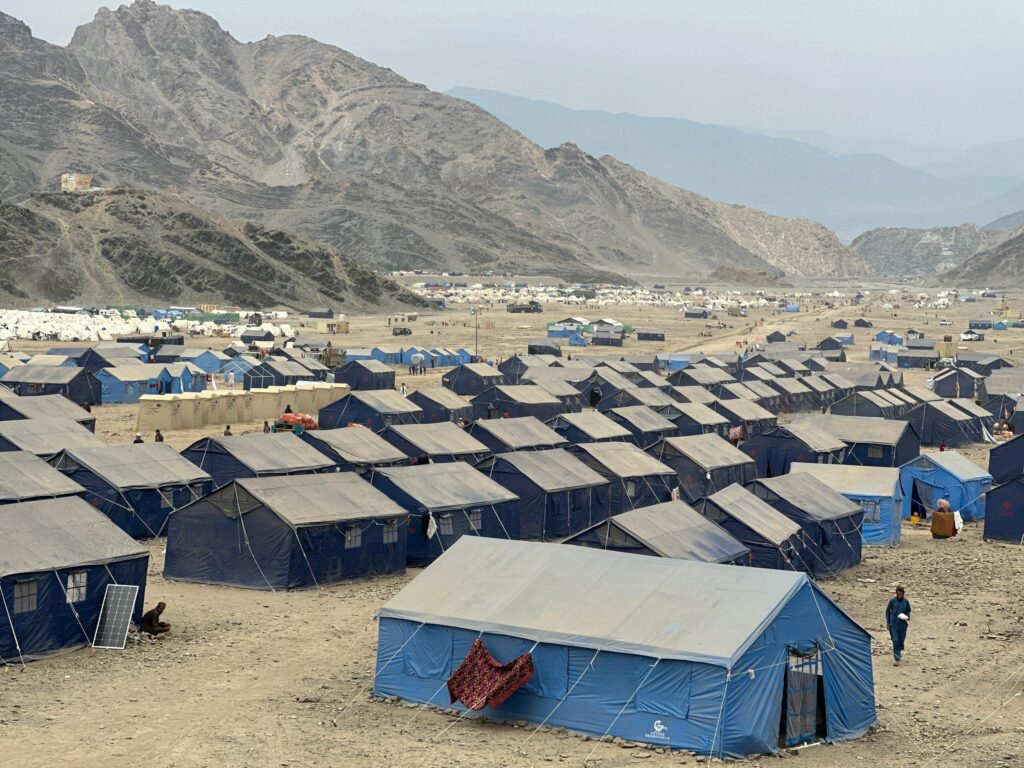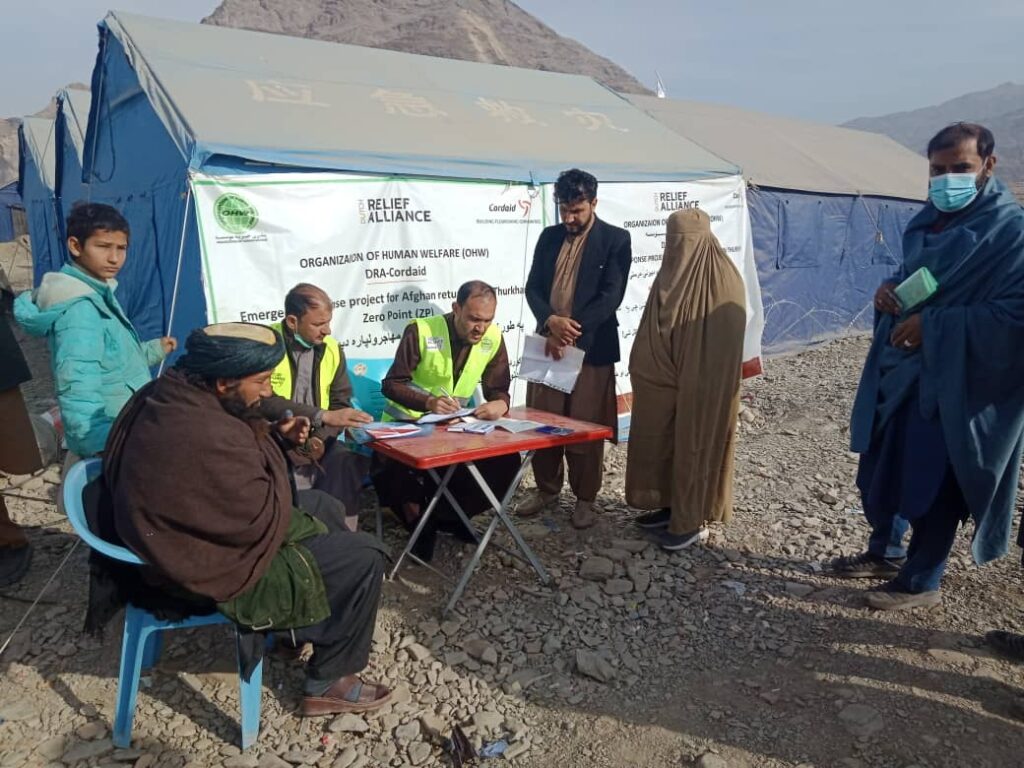As temperatures drop, Cordaid provides winterisation and other support to thousands of forced returnees in Nangarhar province. They are part of over 1,5 million Afghan refugees who face deportation out of Pakistan after an expulsion order for ‘illegal’ migrants was recently issued. The large majority of them are women and children.

Many Afghans now returning from Pakistan left decades ago. Many of the younger ones lived their entire lives in Pakistan, often in big cities. They now have to go back to places of origin they hardly know, often rural villages, and start from scratch in a country that already has over 6 million internally displaced people.
A country that, on top of everything, is still recovering from decades of conflict, political turmoil, an economic crisis, and recent earthquakes. And with little support from the outside world, as international funding for Afghanistan has rapidly dwindled after the Taliban regime came to power in 2021.
A major operation
Latif Bashardost, Cordaid’s Country Director in Afghanistan, recently visited several returnee campsites. “Half a million Afghans have come back from Pakistan in the past two months alone”, he says. “Handling this is a major operation. The current government is deploying whatever means it has to welcome and host Afghans returning from Pakistan. Many governmental departments are involved, including the military, which transports returnees’ belongings to further and final destinations. The government is tested. For them, handling this crisis is a matter of proving themselves to the outside world. And a matter facilitating return after the exodus of 2021.”
“Returning to a country where women’s opportunities are extremely limited and where girls and young women have no access to education, is extra traumatic.”
Returnees are thoroughly screened and registered at border sites like the crowded one in Torkham. “Authorities are making practical use of the digital population database established by the previous administration, which had scanned millions of identity documents in recent years”, Latif explains. “People whose Afghan identity can be confirmed then move on to further destinations. Those without identity cards, and there are many, have a big problem. They will remain in temporary camps until authorities confirm their identity and places of origin. Of all the returnees, these are the most destitute and the most in need of support”, he adds.

What fate awaits women and girls?
“An estimated 80% of the returnees are women and children”, says Anne Kwakkenbos, Cordaid’s gender expert who pays regular visits to Afghanistan. “Their situation is particularly challenging. 15% of the families are women-headed households. Some are widows and have lost their husbands in years of armed conflict. Sometimes, their partner stays abroad, against all odds, to secure income. And then, there is a large group of women who fled Afghanistan after the Taliban seized power in 2021. For them, returning to a country where women’s opportunities are extremely limited and where girls and young women have no access to education is extra traumatic. Any humanitarian action has to consider their immediate and longer-term needs”, Kwakkenbos adds.
Cordaid response: food, water, shelter and winterisation
Using available financial resources from the Dutch Relief Alliance, Cordaid combined efforts with Afghan local humanitarian partners RRAA and OHW as a first response. We have started reaching out to forced returnee families in Torkham in Nangarhar province. This has been one of the most crowded and overstretched areas at the Afghanistan-Pakistan border in the past months.
“We focus on urgent and immediate needs”, Bashardost points out. “In December, we distributed 350 food packages daily to returnees who crossed the border. Packages include rice, meat, vegetables and fruit. In the same month, depending on their size, we hand out blankets and carpets to families to get at least some protection against the cold. We also provide hygiene kits.”
Not all families staying in transit at the border have access to shelter. “This is why, with the means we have currently at our disposal, we provided 160 emergency cluster tents equipped with blankets, carpets and other basic items”, says Bashardost.
Cordaid is also taking care of part of the water provision and waste management in the camp compound in Torkham. We have installed ten water tanks with safe and potable water. Also, in December, we paid and trained ten returnees every day to clean parts of the camp. Their daily wages help them support their families. We have hired a waste truck to help clean even the most remote parts of the compound.
“This migration crisis hardly has the world’s attention. But these people need our support.”
Merciless winter conditions
The Afghan winter is getting harsher. Temperatures can drop to -50 degrees Celsius in some parts of the country. This is why, in the coming months, winterisation support is crucial. “Also for families leaving the camp and moving on to further destinations”, Bashardost explains. “We try to ensure that as many families as possible leave with at least some proper blankets.”

Longer term needs
Beyond the immediacy of winter conditions, Bashardost stresses the importance of livelihood assistance. “People have often lost everything, not only most of their belongings but also their means of income. Starting anew in a country where most people struggle to provide for their families will be extremely tough. They will need all the support they can get, not only economically, but also mentally.”
A lot of the people Bashardost met had gone through traumatic experiences. “They feared being arrested in Pakistan, had to hide, were harassed, and sometimes extorted on their arduous journey to Afghanistan. Mothers were separated from adult daughters who stayed behind with their Pakistani husbands. Many returning mothers are the sole caretakers of younger children and have no future perspective. All that is a lot to carry.”
In Afghanistan, Cordaid is investing its limited means as wisely as possible. This is a balancing act in a country where two-thirds of the population needs humanitarian assistance and with dwindling international support.
Forgotten crisis
“This migration crisis hardly has the world’s attention. But these people need our support. This is why Cordaid has decided to include returnees in all our emergency programmes from now on, whether it be livelihood support, mental health support, or other forms of support. And, of course, we will continue to lobby for more support to the people of Afghanistan”, Bashardost concludes.